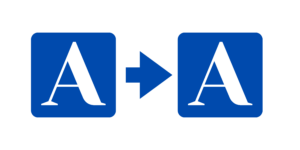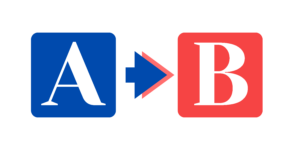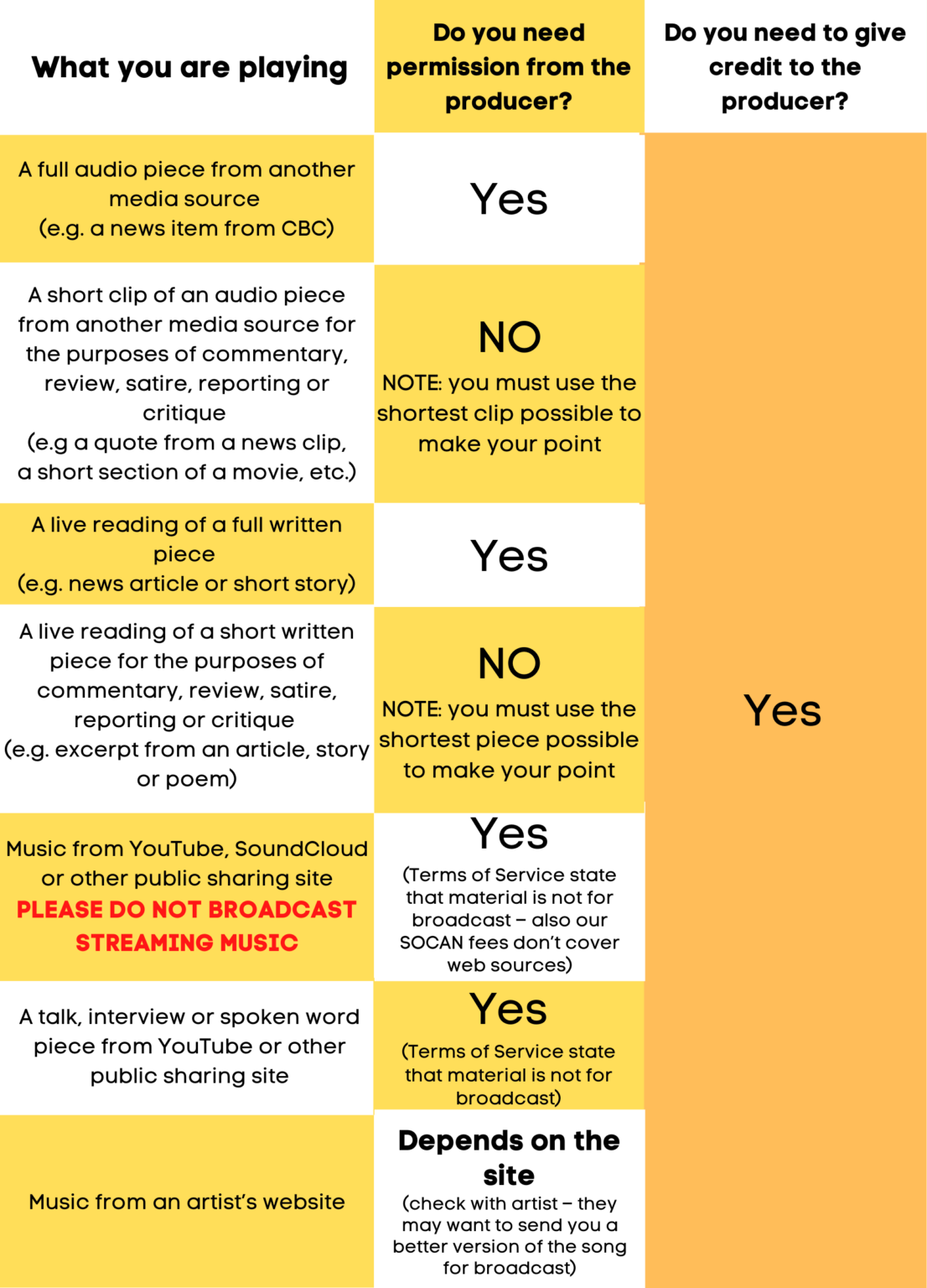 Policy and Regulations
Policy and Regulations
cfro 100.5FM 2019
What are your responsibilities as a programmer at Co-op Radio?
● Be a member
● Help show raise $1000 per year, per hour of weekly airtime
● 2 hours of volunteer time/month
● Take required training courses
● Stay informed through the Co-op Radio Connector
● Inform yourselves of policies
● Fill out a log sheet for every show
● Produce excellent radio!
The station must run very efficiently in order to survive on limited resources, the organization is divided into 4 main areas
● Membership (getting new members and keeping existing members)
● Programming (what’s on the air)
● Technical (anything with an electrical current attached)
● Finance (money in and out)
Current staff positions:
● Executive Director: Bryan McKinnon
● Director of Programming:
● Director of Member Services: Debbie Roche
● Director of Technical Services: Hector Baltazar
● Outreach Coordinator: Kimit Sekhon
● Each department has a committee that you can contribute to, if you want to
be part of decision-making in these areas
As a radio station, we are bound by laws and policies regarding broadcasting. These are:
● Broadcast Act and Radio Regulations
● Copyright Act
● Civil Law
● Co-op Radio Policies
 Transitions from one show to the next can be stressful as there are many elements to coordinate within a short amount of time. All programmers are expected to conduct themselves respectfully and co-operatively in order to facilitate these transitions.
Transitions from one show to the next can be stressful as there are many elements to coordinate within a short amount of time. All programmers are expected to conduct themselves respectfully and co-operatively in order to facilitate these transitions.
Transitions must ensure that shows coming on the air have enough time to set up and that the broadcast signal is of high quality at all times. It is preferable that time between shows be used for station announcements, however, transition periods can consist of a mix of station announcements, music and/or content from the show that is ending.
Same control room
 When subsequent shows are using the same control room, the show that is ending is required to leave the control room 3 minutes before the beginning of the next show. The purpose of this requirement is to ensure that the next show has time to set up before
When subsequent shows are using the same control room, the show that is ending is required to leave the control room 3 minutes before the beginning of the next show. The purpose of this requirement is to ensure that the next show has time to set up before
they begin broadcasting.
As all shows begin and end on the hour or half hour, the show that is ending is responsible for the content that is left playing when they leave the control room. They should leave enough content so that the next show is not required to fill dead air. The next show is required to allow all content left playing to continue until the beginning of their show. On air material should never be abruptly cut off and all transitions should be smooth.
Note: Subsequent shows may develop their own informal protocols that facilitate their particular transition – for example, a show may start the next show’s theme song because it was determined that was easier for both shows. However, if there is any disagreement, this policy and procedure supersedes any informal protocols.
Different Control Rooms
 When subsequent shows are using different control rooms, there is no requirement for the show that is ending to leave the control room early. In fact, they are required to stay in the control room until the beginning of the next show in order to switch the signal.
When subsequent shows are using different control rooms, there is no requirement for the show that is ending to leave the control room early. In fact, they are required to stay in the control room until the beginning of the next show in order to switch the signal.
The show that is ending is required to end their content fully (i.e. to silence, not to fade under) and to push the switch for the other control room at the start time of the next show. In order to avoid abruptly cutting-off content or airing disjointed transitions, the next show may not push the switch and the switch must happen when there is a moment of silence on air.
Studio

When subsequent shows are using the studio, the show that is ending is required to leave the studio 3 minutes before the beginning of the next show. The purpose of this requirement is to ensure that the next show has time to set up before they begin broadcasting.
All control rooms and the studio must be booked in advance through www.coopradio.org/booking
 A Station ID consists of CFRO’s call letters, station name (including city), show name, and FM frequency - e.g. “You are listening to Vancouver Co-operative Radio, CFRO, 100.5FM. This is Luscious Lola’s Lounge Licks.” Station IDs must be aired at least 3 times every hour and 4 Station IDs per hour is recommended. One Station ID must be aired at the beginning of every show. One Station ID must be aired within 5 minutes of the beginning of every hour. One Station ID should be aired within 5 minutes of every half hour (i.e. the bottom of the hour). A PSA (Public Service Announcement) or Show Promo should be played at least twice an hour.
A Station ID consists of CFRO’s call letters, station name (including city), show name, and FM frequency - e.g. “You are listening to Vancouver Co-operative Radio, CFRO, 100.5FM. This is Luscious Lola’s Lounge Licks.” Station IDs must be aired at least 3 times every hour and 4 Station IDs per hour is recommended. One Station ID must be aired at the beginning of every show. One Station ID must be aired within 5 minutes of the beginning of every hour. One Station ID should be aired within 5 minutes of every half hour (i.e. the bottom of the hour). A PSA (Public Service Announcement) or Show Promo should be played at least twice an hour.
These items can be found at http://www.coopradio.org/show-promos Please contact Laurence@coopradio.org if you would like to be involved in creating new Station IDs, PSAs or Show Promos.
Copyright Rules

Why is it important to ask for permission?
Most importantly, the work belongs to the person/group who created it. So they need to have a say in how it gets used. If they don’t like how it gets used, they could decide to
sue the station. The cost of entering into a lawsuit (even if the station won) would be enough to bankrupt the station. So, we need to make sure we have permission.
What does permission look like?
Permission should be in writing. It can be as straightforward as an email from the producer giving you permission to air their piece on your show. Or, it could be as
complicated as a signed written agreement. The producer needs to be aware of HOW the material will be used:
- It will be broadcast live on the air
- It will be streamed live on the station’s website
- It will be archived on the station’s website for 3 months (though the content is not
downloadable)
- It may be archived on your own show’s website as well
1 – Get guidelines
● Find out how many pieces of music are needed for the show and approximately
how long they should be
● Are there any pieces that should be instrumental?
● Are there any themes that should be covered in the music?
2 - Find the music
Things to think about in your music selections:
● Is this band getting a lot of airplay elsewhere?
● How many songs by women? How many by youth? Etc...
● Do you have enough CanCon?
o 35% for Rock, Pop, Metal and Hip Hop
o 12% for Jazz, Worldbeat, Folk and Classical
o 7% for Ethnic (Non-English or French) programming
https://crtc.gc.ca/eng/cancon/r_cdn.htm
What qualifies as Canadian Content?
To qualify as 'Canadian content' a musical selection must generally fulfill at least
two of the following conditions:
M (music) -- the music is composed entirely by a Canadian.
A (artist) -- the music is, or the lyrics are, performed principally by a Canadian.
P (production) -- the musical selection consists of a live performance that is
(i) recorded wholly in Canada, or
(ii) performed wholly in Canada and broadcast live in Canada.
L (lyrics) -- the lyrics are written entirely by a Canadian.
 Background:
Background:
Defamation is communication about a person that tends to hurt the person's reputation. Legally, defamation is considered a “strict liability tort”, which means that the intentions of the defamer are not relevant. The communication must be made to other people, not just to the person it's about. The statement must be false to be classified as defamation. There are two type of Defamation. Libel is written defamation. Slander is spoken defamation. most often at Co-op radio we will be dealing with slander. If someone feels they have been defamed on our airwaves, they may choose to take the matter before the courts. A judge may find the station at fault for broadcasting defamatory material. Both defense preparation and possible damages could result in severe losses for the station. The station's media liability insurance may cover some of these costs, but such an event would take extensive resources from the station, regardless of the outcome.
Expectations:
The station does not allow defamatory statements to be aired. Statements that harm the reputation of an individual or organization may not be aired if they
● are made maliciously
● have no supporting evidence based in verifiable sources (i.e. no gossip or hearsay)
● have no connection to the content or mandate of the show
● serve no useful purpose for the listeners to know about
If any broadcasted statement (i.e. by a guest, caller or a host) is found to be defamatory, the host must air an apology immediately. If an apology is not aired immediately, a retraction must be aired as soon as possible so as to reach the same listenership (e.g. at the beginning of the next show). If the station airs defamatory statements published by other media sources without clarifying the source to the listener, the station could face a defamation suit. All sources should be clarified to the listener. If the station receives a complaint about defamation, the programmer who aired the statement is expected to liaise immediately with the Director of Programming Administration so as to mitigate the damage. All efforts will be made to address the concerns of the complainant so as to avoid the possibility of going to court. All efforts to mitigate the damage to the person allegedly defamed shall be kept on record. If a programmer does not address the defamation concern adequately, they will be indefinitely suspended from all programming duties at the station. Failure to respect this policy could result in the cancellation of the show.
The Broadcast Act states that any obscene or profane language should not be broadcast. As such, all programmers must avoid airing profanity and obscenity as much as possible. Content containing profanity or obscenity may be appropriate to air if it meets all of the following criteria:
● there is enough artistic and/or educational merit to warrant airing it – i.e. the profanity or obscenity is not gratuitous
● the content is particularly appropriate to a topic being covered on the show
● the content has been listened to in its entirety before airing
● a warning is aired directly before the content advising that the content may be offensive to some listeners, may not be appropriate for younger audiences and that listener discretion is advised (see sample warning below)
● the host of the show describes, on air, why the content was chosen (despite or because of the profanity or obscenity)
● the show's regular audiences are not likely to be offended by profanity or obscenity (e.g. not on a parenting show or a show airing just before or after a kid's show)
● if a program would like to air profanity or obscenity that differs from their regular content, they should consult with the Director of Programming Administration to ensure that the above criteria are met
If profanity or obscenity is aired inadvertently or without the programmer's advanced knowledge (e.g. a caller starts swearing), the programmer must apologize to the listeners as soon as possible after the profanity or obscenity is aired in order to mitigate damage. To avoid inadvertent profanity or obscenity, if a guest or caller is likely to swear or use graphic language, they must be forewarned to avoid such language before going on air. Programs that are more likely to air profanity or obscenity as part of their content will be scheduled after 9pm. Failure to respect the policy will result in a warning for the show.
Sample warning:
The following content contains language that may not be appropriate for some audiences. We have chosen to air this song within the context of our show on the legacy of residential schools because it reflects the emotional damage that residential school has left on survivors and children of survivors. However, we note that listener discretion is advised.
Most shows are produced by collectives this keeps the show more sustainable
The station doesn’t mandate how you should work together
These are the basic elements for keeping your collective strong
1. Outreach to new people
- Should be continual
- On-air
- Social media
2. Select new members
- Not everyone is a fit
- What is their connection to the mandate of your show?
- Ask people to sit in on a show (or 2, 3, 4)
- Be clear about the expectations of them (how much time, what roles, deadlines, consequences)
- Give a probation period / trial run before you accept them
3. Train and integrate new people
- Connect new people with the station: make sure they take required training, become a member...
- Be specific about roles
- Give feedback
- Let them know if it’s not working out
- How will you incorporate and train them? (mentorship, buddy, etc.)
4. Have a clear structure
- What are the roles
- What are the deadlines
- How do you communicate?
- How are decisions made?
- How do you organize your show? (everyone takes on a segment; everyone takes on a show)
- How do you maintain continuity?
5. Evaluate yourselves
- Ask yourselves how it’s going?
- Look at your list of topics covered – what’s missing?
- Do you need more people?
- Do you need to change your structure?
6. Celebrate and connect with each other
- Have regular meetings
- Plan social occasions together
- Do “post mortems” – learn from what you did
- Tell people you appreciate their work! (the opposite of feeling taken for granted is feeling appreciated)


